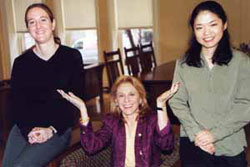Dr. Judy and the Psychology of Intimacy
In a recent interview, Kuriansky said that teaching the psychology of intimacy "expands her students" consciousness about themselves as a person, and ultimately as a professional.
"I run the course very experientially. For me, intimacy means having to experience what it feels like to be open. I stretch myself to be an example of being open. The class is alive because I want everybody to be present in the moment. Everybody needs to be present at this moment, including me. Being present is the first step towards being intimate."
Kuriansky explained that being present "means being in the moment instead of worrying about what you're saying or how you're coming across or worrying about revealing yourself. All of the exercises in the class are designed to create a feeling of trust, a feeling of openness, and an environment where the students can feel comfortable and share what it feels like to be alive."
"Instead of sitting around the table, the tables go to the side and we do some encountering," she said. "It's sort of the modern version of encountering in the new century, as opposed to the seventies."
In terms of the value of this course for clinicians, Kuriansky said, "It's very important to understand what intimacy, openness, commitment, trust, and sharing mean. It's crucial to being a good therapist. I teach those techniques so therapists are able to be with other people and feel secure in who they are-so that they can be open to helping them. It's also important for personal growth. In order to be a good clinician, one needs to be comfortable with who they are."
One of Dr. Judy's aspiring clinicians, TC student Allyson Kett, described the Psychology of Intimacy as "different than the average class. It's more about learning about yourself. At the start everyone was quiet. Eventually I opened up and began to trust people. I learned to express myself on an intimate level and to understand what people are going through. It was a life-changing experience. I needed to learn-to accept who I was-in order to help somebody else in the clinical field."
"Speaking up and being honest in class was very difficult. I guess it was difficult for most of us, but it was one of the most difficult things for me," added Kiyoko Sasaki, Kett's classmate. "I was beginning to accept compliments that I received from other people. I was brought up to be very modest but throughout this course I learned to accept who I was. And when people would say good things about me I came to feel more comfortable."
When asked why she feels more comfortable about herself, Sasaki said, "Probably because everyone was honest."
Published Sunday, May. 19, 2002
